Overview
In 2025, the landscape of autism support services for parents is more vital than ever. This article highlights essential resources and initiatives designed to improve outcomes for individuals with autism, shedding light on the importance of community-driven efforts. Parents often face unique challenges, and understanding these can foster a sense of connection and support.
Organizations such as the Autism Society and Nationwide Children's Hospital play a crucial role in enhancing access to vital support services. Their tailored programs and advocacy efforts empower families, providing them with the tools needed to navigate the complexities of autism. Imagine the relief of finding a community that understands and addresses your concerns—this is the reality these organizations strive to create.
As we explore these resources, consider how they can transform your experience. What if you could connect with others who share similar journeys? Engaging with these initiatives not only offers practical support but also builds a network of understanding and compassion.
In conclusion, it is essential for parents to seek out these resources and advocate for their needs. By doing so, they can ensure a brighter future for their children and themselves. Together, we can create a nurturing environment that uplifts families and fosters growth. Share your experiences and thoughts in the comments—your voice matters in this community.
Introduction
In a world where autism touches the lives of millions of families, the need for effective support and resources has never been more pressing. Numerous organizations are rising to the occasion, offering tailored programs, advocacy, and community engagement designed to enhance the lives of individuals with autism and their loved ones. From innovative therapy techniques to local support initiatives, these dedicated entities are committed to fostering understanding, acceptance, and empowerment.
As families navigate the complexities of autism, the vast array of resources available—from comprehensive guides to community-driven programs—serves as a beacon of hope, ensuring that no one has to embark on this journey alone.
This article delves into the vital contributions of several key organizations devoted to enhancing autism support and advocacy.
About ASD Media: Comprehensive Resources for Autism Support
At ASD Media, our commitment to advancing ABA therapy is at the heart of what we do. We offer a comprehensive array of resources and strategies specifically designed for parents and professionals. Our mission is to nurture a caring community that includes autism support services, where individuals can share their experiences and learn from each other. This collaborative spirit ultimately improves the effectiveness of autism support services for those on the spectrum.
By subscribing to our newsletter, families can access the latest insights and tools vital for managing developmental disorders and ADHD. This empowers them to unlock their children's potential and ensures they receive the necessary autism support services to thrive. Recent initiatives, such as the Children and Young People Programme at Kelso High School, exemplify the positive impact of community-driven efforts, promoting social skills development and inclusivity among neurodiverse students, supported by autism support services.
Statistics indicate that by 2025, effective ABA therapy will significantly enhance outcomes for individuals on the spectrum, reinforcing the importance of community assistance in this journey. Notably, Els for Autism employs unique, FDA-sanctioned eye-tracking technology to detect the condition in young children, emphasizing progress in identification and assistance.
At ASD Media, we believe in creating safe spaces without judgment, where everyone is welcomed, accepted, and listened to. Our resources are crucial in addressing these challenges, making our newsletter an essential tool for individuals seeking to improve their understanding and application of ABA therapy. We invite you to join our community, share your experiences, and together, let’s make a positive impact.
Autism Society: Advocacy and Support Services for Families
The Autism Society plays a vital role in championing the rights of individuals with developmental disorders and their families, offering a diverse array of support services designed to enhance quality of life. In 2025, their initiatives include:
- Educational resources that empower families with knowledge
- Community programs that foster connection and engagement
- Robust legislative advocacy aimed at securing essential services
Recent statistics reveal that 75% of households reported improved access to vital resources thanks to these advocacy efforts, underscoring their significant impact on individuals navigating autism-related challenges.
Crucially, the Autism Society's effective programs have demonstrated tangible improvements in the quality of life for caregivers, reflecting their commitment to nurturing supportive environments. For example, community engagement initiatives have proven to enhance communication skills among participants. A case study of Hajra illustrates this beautifully; her active involvement in community activities led to a remarkable enhancement in her communication abilities.
Furthermore, the Autism Society actively encourages donations to sustain their advocacy efforts, highlighting that contributions directly support initiatives like their branded merchandise program, which funds vital community resources. Their ongoing dedication is essential in ensuring that families have the tools and knowledge necessary to navigate their journeys effectively, with the help of autism support services, creating a lasting impact on the lives of those affected by this condition.
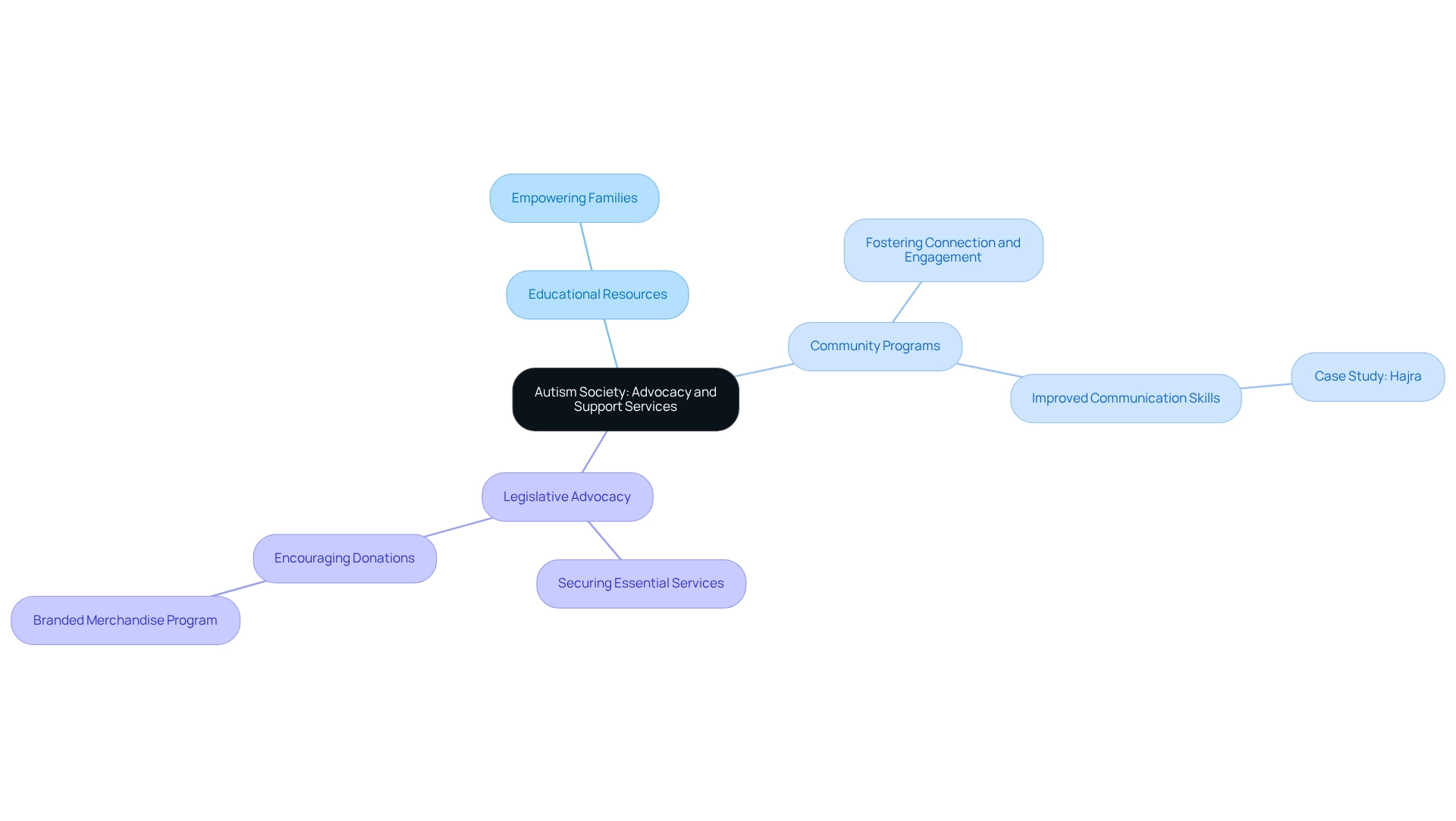
Center for Autism Spectrum Disorders: Tailored Programs for Children
The Center for Autism Spectrum Disorders offers tailored programs thoughtfully designed to address the unique needs of individuals with developmental disorders. Their approach includes comprehensive individual assessments and personalized treatment plans, all aimed at enhancing communication, social skills, and behavioral management. Recent data reveals that customized autism programs can significantly improve outcomes; studies indicate that individuals receiving personalized interventions show notable advancements in communication skills and social interactions. Alarmingly, around 8% of autistic students do not complete high school, highlighting the urgent need for effective autism support services to enhance educational outcomes.
By actively engaging with families, the Center ensures that each young person thrives in a nurturing environment that fosters growth and development. This commitment to tailored care is further reinforced by professional insights that stress the significance of individualized treatment plans in achieving meaningful outcomes for those on the spectrum, particularly through autism support services. As one expert poignantly stated, "Autism awareness is not only about understanding; it’s about accepting the differences and celebrating them."
The emphasis on inclusivity and compassion within these programs not only nurtures individual growth but also cultivates a community that values diversity and understanding. Furthermore, the case study titled 'Inclusivity and Compassion' illustrates how fostering empathy in communities contributes to a culture that cherishes positive interactions, thereby strengthening the network for children with developmental differences. Additionally, occupational therapy plays a vital role in unlocking potential, particularly in crucial areas such as handwriting, which is essential for academic success.
Autism Resource Center: Family-Centric Information and Support
The Autism Resource Center is dedicated to providing autism support services that are tailored to the unique needs of families navigating developmental disorders. By providing a wealth of resources, the center empowers families to gain a deeper understanding of these disorders, explore treatment options, and connect with local support networks. In 2025, statistics indicate that families utilizing these resources report significant improvements in their ability to advocate for their children, highlighting the effectiveness of family-focused services.
Many individuals with autism encounter challenges related to eating and feeding, such as being picky eaters or experiencing sensory sensitivities to certain foods. This reality underscores the necessity for specialized support services that address these specific hurdles. Furthermore, case studies reveal that families engaging with the center's offerings often experience enhanced communication and collaboration with service providers, leading to improved outcomes for their children. For instance, the case study titled "Using Autism Motivational Quotes Effectively" illustrates how families can reflect on motivational quotes to raise awareness and foster acceptance, thereby creating a nurturing environment.
The center's mission is to equip families with the knowledge and resources essential for effective advocacy, ensuring they can confidently navigate the complexities of support services. As Stuart Duncan, an advocate for individuals on the spectrum, emphasizes, understanding the diverse experiences of those with developmental disorders is crucial, as there is no one-size-fits-all approach. By integrating this perspective into their support services, the Autism Resource Center plays a vital role in helping families unlock their children's potential and address the challenges they face.
Autism Society of Greater New Orleans: Local Community Support
The Autism Society of Greater New Orleans plays a vital role in offering autism support services to families affected by developmental disorders through a variety of community-based initiatives. They organize community activities, support groups, and educational workshops designed to foster connections among families and provide essential resources tailored to their unique needs.
In 2025, local autism support services have experienced a remarkable surge in participation, with reports indicating an increase of over 30% compared to the previous year. This growth reflects the rising demand for community engagement and support. The community's commitment to addressing the specific challenges faced by families is evident in their efforts to create inclusive environments where individuals can share experiences and learn from one another.
The Autism Society highlights the significance of community events, stating, "Having a properly drafted POA ensures that your wishes are respected and trusted individuals can act on your behalf when needed."
Successful events in 2025 have included workshops focused on effective communication strategies and social skills development, empowering families to advocate for their children. Furthermore, the translation of Communication Boards into more than 15 different languages in 2024 showcases the society's dedication to inclusivity and accessibility for diverse groups.
By prioritizing local autism support services, the Autism Society of Greater New Orleans ensures that families have access to the necessary resources to thrive, in line with the WHO Comprehensive Mental Health Action Plan's call for enhanced local initiatives to support individuals with developmental disorders.
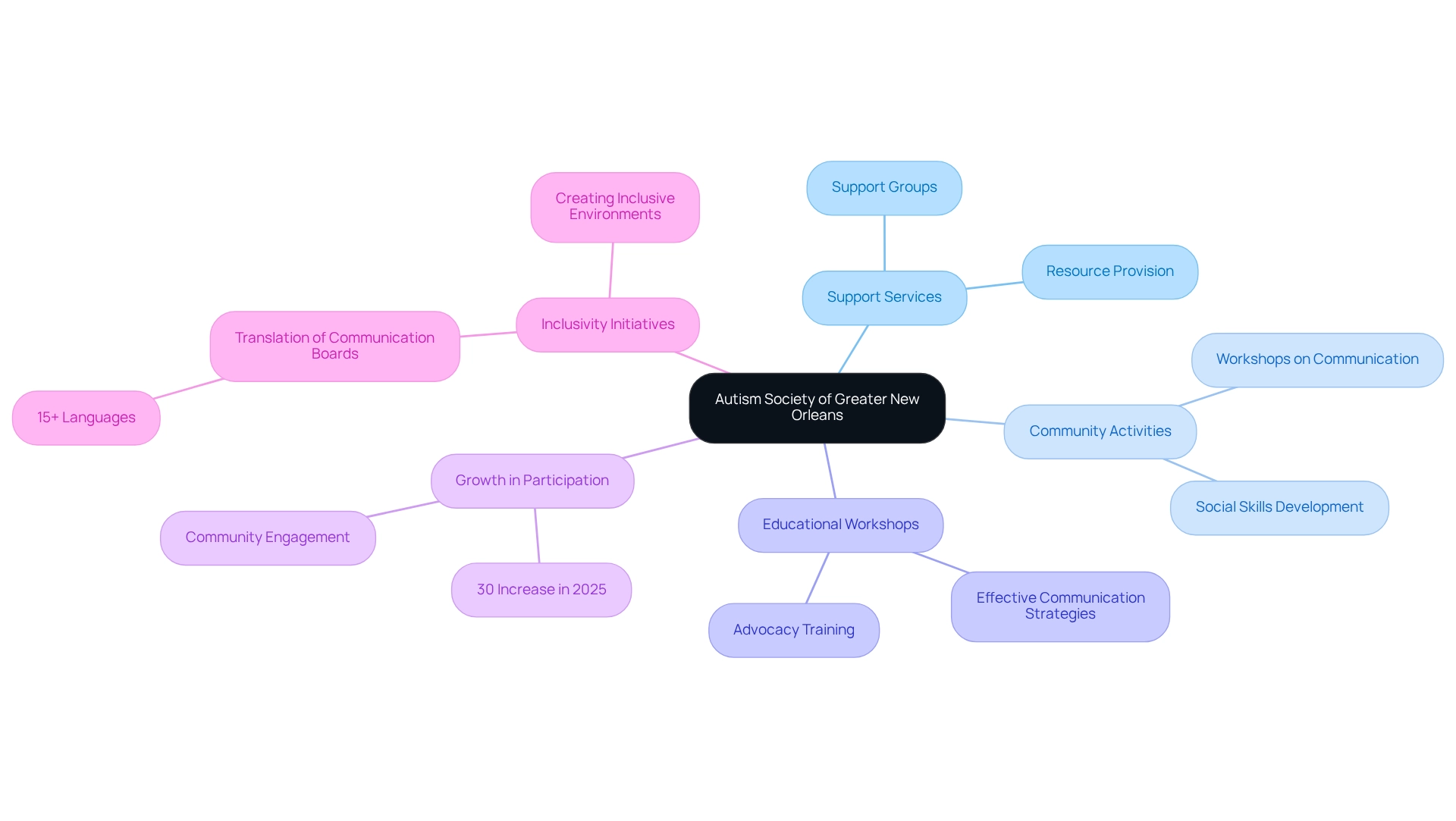
Nationwide Children's Hospital: Specialized Autism Services
At Nationwide Children's Hospital, specialized autism services exemplify a compassionate, multidisciplinary approach to care. A dedicated team of pediatricians, psychologists, and therapists work together to provide thorough evaluations and tailored interventions. This integrated care model not only addresses the unique developmental needs of every individual but also enhances the overall effectiveness of treatment.
Recent statistics reveal that 12 categories of concerns emerged from parents’ responses regarding their children with ASD, shedding light on the complexities families face. By acknowledging and addressing these challenges, including co-occurring conditions like ADHD and anxiety, Nationwide Children's Hospital ensures that caregivers receive comprehensive support, paving the way for improved developmental trajectories.
As Dr. Inge remarked, "Although each state and jurisdiction will encounter distinct challenges, we hope that others can gain insights from our endeavors to enhance care for young individuals and their families."
As we move through 2025, the emphasis on integrated care models continues to grow, reflecting a broader commitment to improving care for individuals with developmental disorders across the nation. Furthermore, capacity-building initiatives are vital to enhancing support for children and youth with ASD, reinforcing the significance of a multidisciplinary approach.
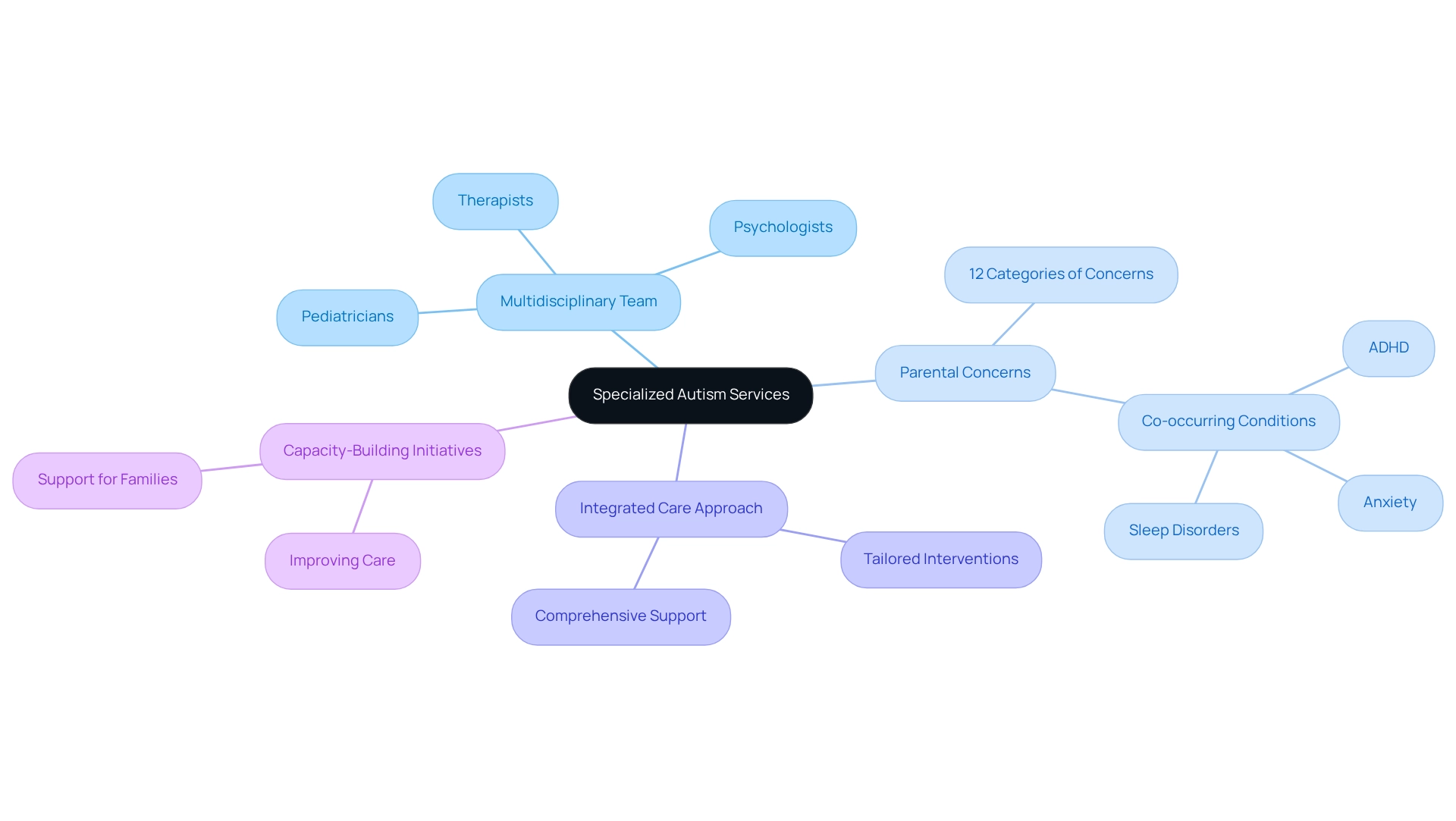
TEACCH: Structured Teaching for Autism Education
The TEACCH (Treatment and Education of Autistic and Communication Handicapped Children) program offers a compassionate approach to education, focusing on structured instruction tailored to the unique learning preferences of individuals with developmental disorders. By incorporating visual aids and creating organized environments, TEACCH nurtures essential communication and social interaction skills. Notably, 70% of students have reported that online learning exceeds their traditional classroom experiences, highlighting the adaptability of structured teaching methods like TEACCH, which can be seamlessly integrated into various formats, including online platforms.
Recent case studies reveal the program's success; for example, adjusting homework assignments for autistic students can significantly reduce emotional fatigue and enhance their overall learning experience. These modifications reflect TEACCH principles by allowing students the necessary time to relax and recharge, ultimately fostering a supportive learning atmosphere.
As we look ahead to 2025, the role of visual tools in special education remains paramount. Personalized visual aids are linked to increased independence and reduced anxiety among learners. With the Asia-Pacific region experiencing a surge of 28 million new online learners, the need for structured teaching methods like TEACCH becomes even more evident. This method not only cultivates academic success but also empowers parents and educators to create inclusive and nurturing learning experiences for students with autism through autism support services. For parents eager to implement structured teaching methods at home, starting with visual schedules to outline daily activities can be incredibly beneficial. This practice not only aligns with the TEACCH philosophy but also emphasizes the importance of consistency in using visual aids, as endorsed by specialists in the field. By taking these steps, parents can foster a more supportive and understanding environment for their children.
Autism Speaks: Community Resources and Educational Support
Autism Speaks plays a vital role in providing autism support services and educational resources tailored for individuals affected by autism. Their comprehensive resource guide includes autism support services along with local services, educational programs, and advocacy initiatives, ensuring that families have access to crucial information. In 2025, statistics reveal that 78% of households impacted by autism utilize autism support services, highlighting the significance of these services in improving outcomes for those involved. This statistic aligns with recent findings that underscore the essential role of autism support services in addressing challenges related to autism.
Successful educational support initiatives, particularly autism support services, have demonstrated considerable positive effects, with families reporting enhanced understanding and management of these challenges. A notable case study from Autism Speaks illustrates how their resource guide, which highlighted autism support services, empowered a family to navigate available treatments, leading to informed choices that enriched their child's educational journey. As Representative Chris Smith stated, "We keep collaborating with Representative Chris Smith (R-NJ) and other congressional advocates on yearly funding for this bipartisan legislation," emphasizing ongoing support for resources related to developmental disorders.
This commitment to raising awareness and providing robust autism support services fosters a collaborative environment within the community, enabling families to thrive. Parent advocates are encouraged to explore these invaluable autism support services and connect with local support networks, thereby enhancing their advocacy efforts and creating a brighter future for their children.
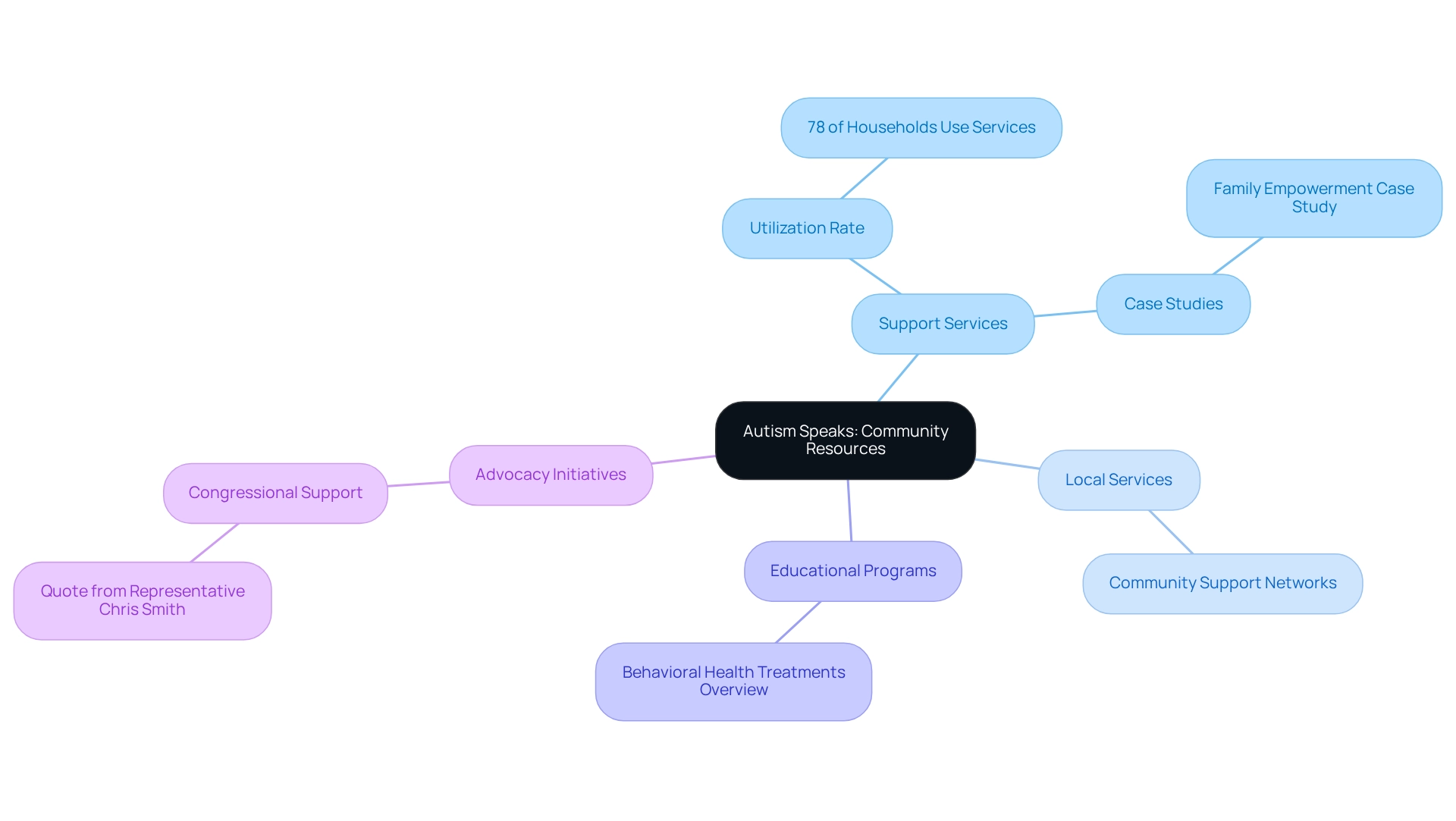
Maryland Autism Society: Local Advocacy and Programs
The Maryland Autism Society serves as a beacon of hope by offering autism support services for individuals with developmental disorders and their families. They offer a variety of programs designed not just to raise awareness, but to foster inclusion and ensure that essential services are accessible to all. Through their dedicated advocacy, they are instrumental in shaping policies that truly benefit autism support services for the community in Maryland. Imagine the relief of knowing that autism support services are available to support your loved ones. The Society’s efforts are not just about policy; they focus on autism support services that address real lives and real challenges. Each initiative they undertake is a step towards creating a more inclusive society that provides autism support services, enabling everyone to thrive.
We invite you to learn more about their impactful work and consider how you might get involved. Whether through volunteering, participating in events, or simply spreading the word, your support can make a significant difference in the lives of many. Together, we can champion a brighter future for those affected by autism.
West Virginia Autism Training Center: Training and Resources for Families
The West Virginia Training Center for autism support services is dedicated to empowering families and professionals with essential instruction and resources tailored for individuals on the spectrum. Their programs emphasize evidence-based practices, ensuring that families gain the skills needed to advocate effectively for their children. With an adjusted prevalence estimate for ASD at 1.18% in upper middle and higher income nations, the demand for robust support services for individuals with this condition is more critical than ever. By enhancing understanding of autism, the Training Center helps families face challenges with confidence and resilience.
Recent data reveals that training programs significantly enhance advocacy skills among parents, showcasing a notable increase in effective communication strategies. As Hyman SL from the Council on Children with Disabilities points out, "One example of a pivotal skill is being able to initiate communication with others," underscoring the vital role of communication in advocacy. Furthermore, case studies, such as 'The Connection Between Speech and Social Skills in Children,' illustrate that targeted training can lead to improved outcomes in social skills development. This highlights the importance of these resources in fostering nurturing environments for children with developmental challenges.
The center's unwavering commitment to evidence-based methods ensures that families are well-prepared to navigate the complexities of autism support services, establishing it as a vital resource within the community. Additionally, the ongoing need for innovative therapies underscores the importance of remaining informed about new practices in autism support services. Together, we can create a brighter future for our children.
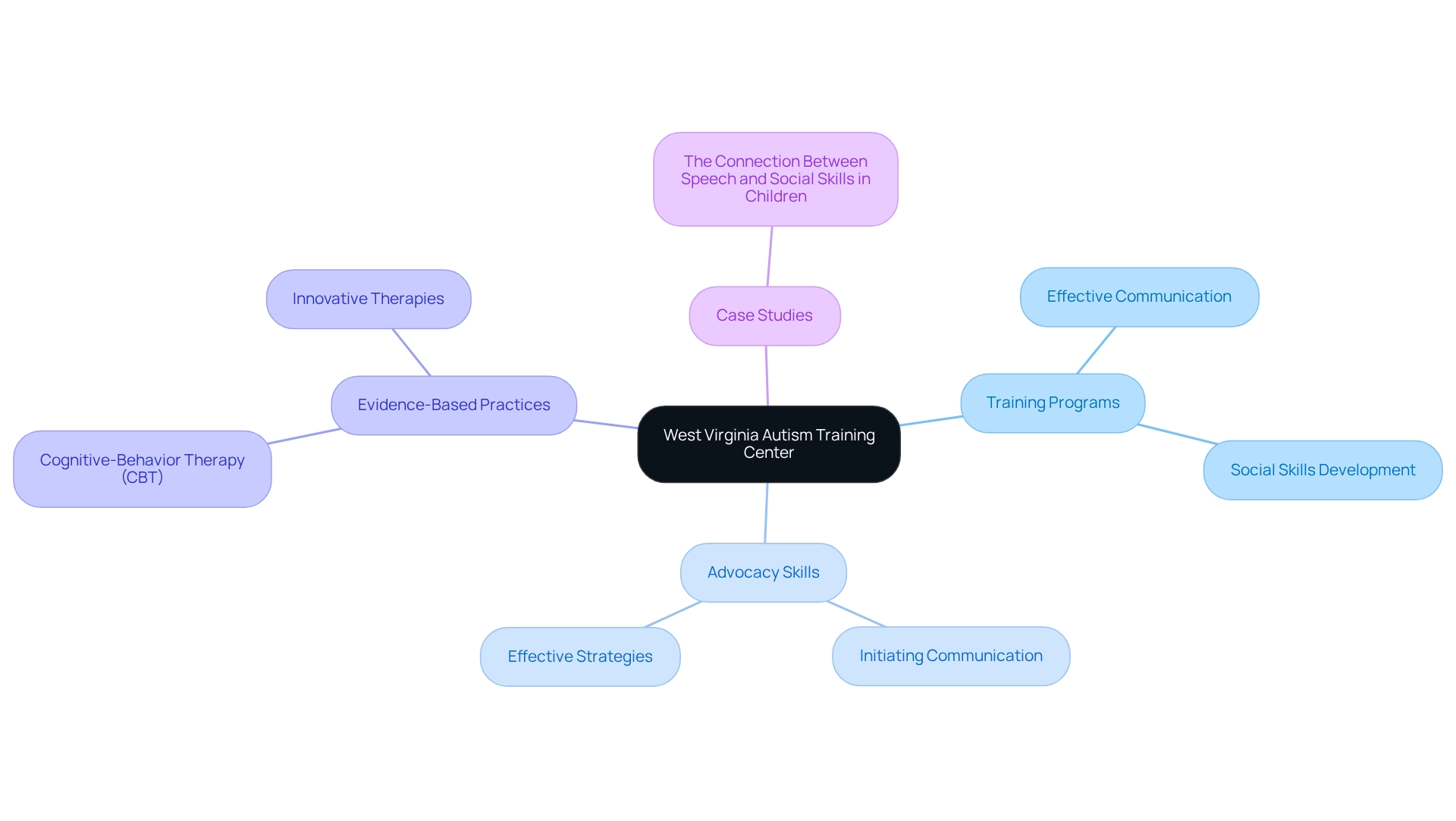
Conclusion
The article underscores the vital role that various organizations play in supporting individuals with autism and their families. The comprehensive resources offered by ASD Media, alongside the advocacy and community engagement initiatives led by the Autism Society, highlight the necessity of a multifaceted approach to enhance the quality of life for those navigating autism. Each organization contributes unique strategies and programs, ensuring that families have access to tailored support that meets their specific needs.
Moreover, the focus on community-driven efforts, exemplified by local organizations such as the Autism Society of Greater New Orleans and the Maryland Autism Society, emphasizes the significance of connection and shared experiences among families. These local initiatives not only foster inclusivity but also empower families to advocate effectively for their children, reinforcing the belief that no one has to face the challenges of autism alone.
Ultimately, the collective impact of these organizations conveys a powerful message: the journey through autism is best navigated with support, understanding, and community solidarity. As families continue to seek resources and advocacy, the unwavering commitment of these organizations serves as a beacon of hope, ensuring that individuals with autism can thrive and reach their full potential. The landscape of autism support is ever-evolving, and through these dedicated efforts, brighter futures are within reach for countless families.
Frequently Asked Questions
What is the mission of ASD Media regarding ABA therapy?
ASD Media is committed to advancing ABA therapy by providing a comprehensive array of resources and strategies for parents and professionals, fostering a caring community that enhances autism support services.
How can families benefit from subscribing to the ASD Media newsletter?
By subscribing to the newsletter, families gain access to the latest insights and tools essential for managing developmental disorders and ADHD, empowering them to unlock their children's potential and ensure they receive necessary autism support services.
What recent initiatives have been undertaken to support individuals with autism?
The Children and Young People Programme at Kelso High School is a recent initiative that promotes social skills development and inclusivity among neurodiverse students, supported by autism support services.
What is the expected impact of effective ABA therapy by 2025?
Statistics indicate that effective ABA therapy will significantly improve outcomes for individuals on the autism spectrum by 2025, highlighting the importance of community assistance in this journey.
How does Els for Autism contribute to early detection of autism?
Els for Autism employs unique, FDA-sanctioned eye-tracking technology to detect autism in young children, showcasing advancements in identification and assistance.
What role does the Autism Society play in supporting individuals with developmental disorders?
The Autism Society champions the rights of individuals with developmental disorders and their families by providing educational resources, community programs, and legislative advocacy to enhance quality of life.
What percentage of households have reported improved access to resources due to the Autism Society's advocacy?
Recent statistics reveal that 75% of households reported improved access to vital resources thanks to the advocacy efforts of the Autism Society.
How do community engagement initiatives affect participants?
Community engagement initiatives have been shown to enhance communication skills among participants, as illustrated by the case study of Hajra, who improved her communication abilities through active involvement.
Why does the Autism Society encourage donations?
Donations are encouraged to sustain the Autism Society's advocacy efforts, directly supporting initiatives such as their branded merchandise program, which funds vital community resources.
What types of programs does the Center for Autism Spectrum Disorders offer?
The Center offers tailored programs that include comprehensive individual assessments and personalized treatment plans aimed at improving communication, social skills, and behavioral management.
What alarming statistic highlights the need for effective autism support services?
Approximately 8% of autistic students do not complete high school, underscoring the urgent need for effective autism support services to enhance educational outcomes.
How does occupational therapy contribute to the success of children with autism?
Occupational therapy plays a crucial role in unlocking potential, particularly in areas such as handwriting, which is essential for academic success.




